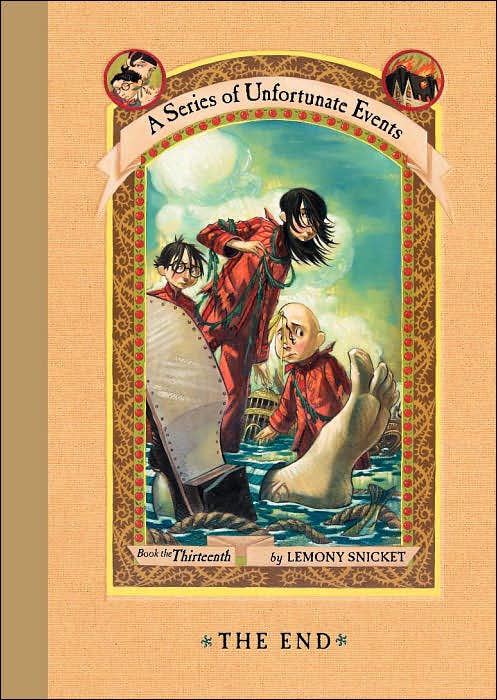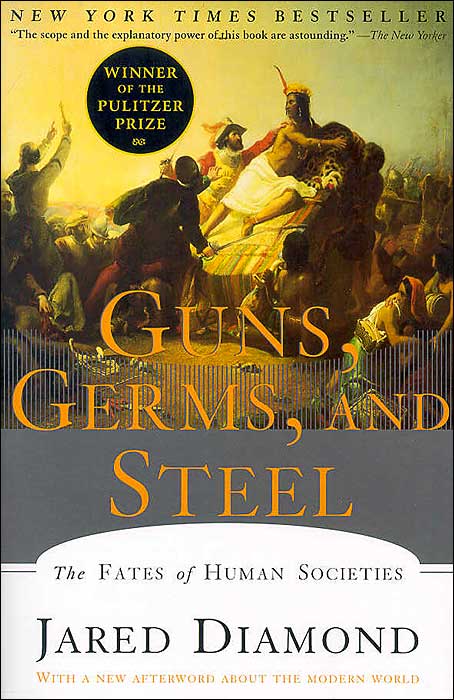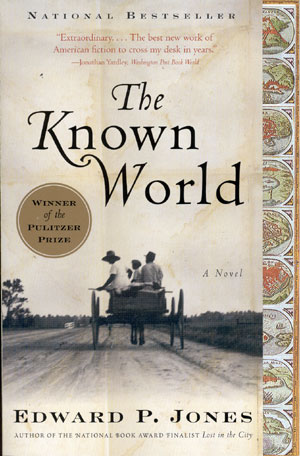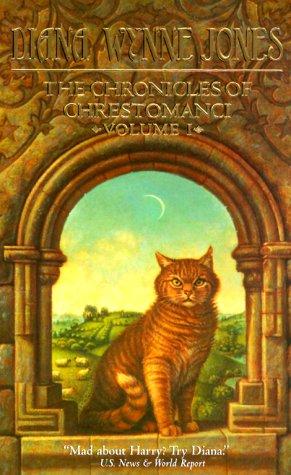This year I read 41 non-academic books (and now that classes are over, I expect to add a book or four or five to that list before the new year). 21 of these were fiction, some serious (like Tess of the D’Urbervilles), some less so (The Da Vinci Code, for example), and most were somewhere in between. 8 were children’s or young adult literature. 12 were non-fiction, a much larger proportion than any previous year. I enjoyed most of the books I read, and had only a small handful of blatant failures (for the life of me I could not make it all the way through Godel, Escher, Bach, Wuthering Heights, or Leven Thumps and the Gateway to Foo, which were recommended, respectively, by my friend, my sister, and my roommate).
So from this list of 41 books, I have carefully chosen my top ten. This turned out to be harder than expected. I chiseled the list down to fourteen pretty easily, then to twelve with some difficulty, but then had a devil of a time figuring out which two to eliminate in order to make ten. In the end I scratched Tess because while I liked the book, I hated reading it, knowing that every time something good happened it was inevitably going to turn out rotten. I also got rid of Atonement by Ian McEwan just because I couldn’t figure out how to say why I liked the book (especially since I read it way back in January, on the plane home from last Christmas break), and that made it problematic for a blog entry. But it’s a good book. I recommend it. Eric would agree.
So after much deliberation, I present Amy’s Top Ten Books of 2006, in alphabetical order.
 102 Minutes: The Untold Story of the Fight to Survive inside the Twin Towers
102 Minutes: The Untold Story of the Fight to Survive inside the Twin TowersJim Dwyer & Kevin Flynn
In a way, this book seems very different from all the other books on my list, though I’m not sure I can say how. A lot more journalistic, maybe. I picked it up after my trip to New York City in May. On my last morning in the city I got up early for one last run in Central Park, and had showered, changed, and left the hostel before my travel companions were even awake. I made my way down to Wall Street to see the narrow streets and canyons of office buildings, and then walked to the site of the Twin Towers, and was suddenly struck by the enormity of the event in a way I had not experienced before. There was something about being there that was different, and emotional, and reading this book a couple weeks later may have been a way of satisfying this need to connect myself to a situation I felt but didn’t understand. I don’t know how else to explain it. Once I picked up the book, though, I could not put it down. It was confusing at first, with so many names and personal histories, most of which came up once and only once, but the story was a story of being human in the midst of something bigger than oneself, and reading the book was an experience in itself that I could not get out of my mind for weeks.
 The Amazing Adventures of Kavalier and Clay
The Amazing Adventures of Kavalier and ClayMichael Chabon
This was my birthday gift from Eric this year, and it was every bit as good as he said it was. Actually, I’d had my eye on it since reading Summerland a few years ago, but since I didn’t know anyone else who had read it I was never quite willing to blindly fork over $15 for it. That’s where it comes in handy to have a brother who is also an avid reader. The book has everything going for it—good writing, engaging plot, believable characters. It takes place in New York City (but when I read this, unfortunately, I had not yet been to New York) and spans several decades in the lives of two cousins who aspire to enter the emerging comic book industry. It’s not an American Dream story of success and rising up the social ladder, nor is it a story of passion doomed to failure (and it could have become either of them). It’s also not a book written for the sake of the art, although it’s very well-written, nor just for the sake of the story, though the story is good. It was enjoyable and intelligent, and that’s the kind of book I like best.
 Body and Soul
Body and SoulFrank Conroy
Body and Soul is the story of twenty years or so in the life of a child music prodigy, and it was wonderful. We read this “book club style” for one of my classes, and although we never actually got around to discussing the book and its significance to our work, I don’t resent in the least the time I put into it. There was no real story, although there were some themes and resolutions. Sometimes events were described for no apparent reason, and sometimes events and long periods of time were skipped over without apology, and eventually I got used to just taking everything at face value. That’s what life is like—some things happen that are obviously significant, and other things just happen, and shape the person you become only in combination with everything else that occurs. That’s how this book was written, and in the end I was content.
 Complications: Notes on an Imperfect Science
Complications: Notes on an Imperfect ScienceAtul Gawande
I also read this book for a class (the same class, actually—it was nice to have some non-academic reading in an academic coure). But since it’s something I might have picked up on my own, and since it turned out to be one of my absolute favorite books of the entire year, I feel justified in including it. Gawande is a surgeon, and he writes about learning to be a surgeon, mistakes made, medical puzzles, and the human aspect of medicine. We don’t always think about that. We expect our doctors to be able to tell us what’s wrong and to be able to fix it, and we get frustrated when they can’t. But the truth is that science hasn’t figured everything out yet (and probably never will), that doctors are also learners and they’ve got to learn on real people, that the medical profession is full of real people with real lives who make real mistakes. Interestingly enough, rather than scaring me away from doctors and surgeons, the book made me feel a lot better about medical care simply because it made me understand it from a personal perspective, and because it was so honest. It was also a great read, full of anecdotes but never straying from the point, well-written, and just fascinating overall.
 The End
The EndLemony Snicket
When you invest yourself in a series of books or movies, you are setting yourself up for potential disappointment, and although I had anxiously awaited this book, I was also worried. I loved the rest of the series, for the story, for the writing, and for the sheer creativity of both, but the final book in a series is always loaded with more reader expectations than any other book that comes before. My biggest worry was that the Baudelaire orphans would come to as bad an end as their beginning—after all, the whole series revolves around unfortunate events and an unfortunate ending would be completely consistent with the premise, and a happy ending would be a bit inconsistent. And yet, I certainly didn’t want the series to come to an unhappy end.
I won’t tell you what happened, in case you haven’t read the book, but I will say that the end of the series was perfect. The more I think about it, the more I like the final chapter in the saga, and the whole series. What I will give away is that there are a lot of loose ends. I’ve heard some people express dissatisfaction and frustration with this, and others expressing delight that it leaves open the possibility of a continuation of the story. Personally, the ending was so consistent with what I’d come to expect from the book that I never even noticed the loose ends until people started talking about them, and then once I did notice I felt absolutely convinced that that was how it should be. The loose ends were meant to be there, and not (I hope) to leave open the option for sequels. I could write a lot more, but I won’t because you still have 5 more reviews to wade through. Suffice it to say that I thought The End was perfect, and that if you haven’t read this series you should read it. All of it.
 Good Omens
Good OmensTerry Pratchett & Neil Gaiman
Sometimes I pick up a book in the bookstore out of curiosity, sit down on a chair, and begin reading, and after several return visits and a hundred pages or so I figure I’m going to finish the book anyway so I might as well buy it. This was one of those books. It strikes me as something that the authors wrote just for the fun of it, and then decided that they might as well publish it and see if anyone else got the humor. Just for that I can forgive the moments where the plot is weak or where the jokes are a bit clichéd. And because overall the plot holds together nicely and the jokes really are funny. It’s an apocalypse story about an angel and a devil, who really only differ in personality and happenstance of employment, and the son of Satan (misplaced at birth) who is really just a mischievous little boy growing up in the English countryside. There is a clash of good and evil, destiny and will, a bit of blasphemy to keep you from taking the book too seriously, and an interesting morality that makes you realize its not just all fun and games. But it is awfully fun.
 Guns, Germs, and Steel
Guns, Germs, and SteelJared Diamond
I’ve already written about this one, but it still makes the top ten. A friend of mine who is an archaeology major told me that she hadn’t been particularly impressed with the book—it didn’t tell her anything she hadn’t already heard over and over again in her college classes. But I’m not an archaeology major, and to me the synthesis and interpretation of information about resources (plants, animals, minerals) and geography, and how they contributed to lifestyles of various peoples throughout the world and throughout history (and to what happened when they came together) seemed both intuitively obvious, and yet entirely new. I love it when I look at the world differently after reading a book, and especially when that change in perspective lasts well after my reading.
 In a Sunburned Country
In a Sunburned CountryBill Bryson
I have loved every Bill Bryson book I have read. He has my dream job—travel the world, write entertaining and informative narratives about the experiences, and return home to a nice, normal life with a loving spouse and children. By the time I finished his account of being heat-stricken, frozen, scratched, hungry, exhausted, aching, and sometimes downright miserable in A Walk in the Woods I still felt about ready to jump on a train and go try hiking the Appalachian Trail myself. This particular book, of course, had me itching to board a plane to Australia. It turns out that there’s an awful lot I didn’t know about this country, about its history, geography, people, political climate, and culture. I knew it was a prison colony, that Australians have great accents and like their beer, that a lot of math education research takes place in Australia (interestingly enough), and that every one of the castaways on Lost had some business or other in Australia before their fated flight. Apparently its even more interesting than that, and even if you don’t have any desire to travel there you ought to read this book for the sheer entertainment value. And then you’ll want to travel there anyway.
 The Known World
The Known WorldEdward P. Jones
I couldn’t tell you what this book is about. The back of the book says it’s about a black farmer and former slaveholder, his death, and the chaos that ensues, but that makes it sound like the repercussions of his death are the story, and that’s not it at all. The book is about the people—a black slaveholder, his slaves, his family, his white mentor, the other residents of the county. The events are the backdrop for their lives, and not the subject of the book, though they’re also not irrelevant. My favorite part of the book was the way it was written, matter-of-factly, jumping backward and forward in time without fuss, giving away bits and pieces of the story casually (“years later when his wife had died…”) so that you knew that the “what will happen next?” suspense was not important. Except that I still wanted to know what happened next, it’s just that this wasn’t all I wanted to know. I’m really not one for historical fiction, and I usually sort of subconsciously avoid it, but this was awfully good historical fiction.
 The Lives of Christopher Chant
The Lives of Christopher ChantDianna Wynne Jones
I read a lot of books in my childhood, and I have been particularly drawn to child and YA fantasy, and so it’s surprising that until very recently I had never encountered, even heard of, Dianna Wynne Jones. It wasn’t until I discovered Hayao Miyazaki, and realized that his newest film was based on a book (which, of course, I had to read before I saw the movie) that I picked up Howl’s Moving Castle.
There are so many children’s books I wish I had discovered when I was younger. I think that a lot of books for young readers are best appreciated when you can look at them with both children’s and adult’s eyes, and I think this requires either having read them oneself as a child, or actually reading them to a child. As it is, I began reading Dianna Wynne Jones books with adult eyes only, and the first two were enjoyable but that was about it. I persisted because I knew of people who really liked these books and I wanted to know why, and The Lives of Christopher Chant, my third read, was the one where I finally finished and said, Ah yes, that’s why people like these books, because I finally understood her writing and storytelling style and could then appreciate it, and especially appreciate how imaginative and just plain fun the books are. And I will certainly read them to my children.
Oh, and it’s official. I now have no more room on my bookshelf.






2 comments:
WOO HOO, thank you for this list!
If there's no more room, than I guess I'd better not get you a Christmas gift. Oh well.
By the way, I still haven't read "The End," so be sure to bring that one home over Christmas. Please.
On an unrelated note, it seems as though I just failed the word verification test. Are the tests getting harder, or am I getting dumber?
Post a Comment